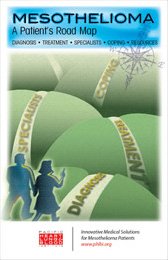About Mesothelioma
Mesothelioma is an aggressive form of cancer that affects the mesothelium, a protective membrane that covers internal organs of the body including the lungs, heart and abdominal organs. Mesothelioma can develop at any of these sites, but approximately 75% of the time it is the lung lining, or pleura, that is affected.
Each year, 2,000 to 3,000 people in the United States are diagnosed with mesothelioma. The only universally accepted cause of mesothelioma is exposure to asbestos. Asbestos is the general name given to a group of minerals which can be separated into durable threads or fibers. Because it is resistant to heat, fire, electricity and chemicals, asbestos was used in thousands of industrial, construction, automotive and commercial products through the years. Unfortunately, the indestructible properties which make asbestos so effective in these products are also what make asbestos extremely toxic to the human body.
Asbestos fibers are finer than human hair and invisible. The fibers are easily inhaled and, because of their long thin shape, are often immune to the body’s natural defense mechanisms against foreign bodies entering the airways. The fibers are able to proceed past the lung and lodge into the pleura.
Over the course of 20 to 60 years, the fibers can cause inflammation and fibrosis which damage the DNA of the mesothelial cells lining the pleura and lead to the appearance of malignant tumors. If left untreated, the tumors can spread throughout the pleural space as a sheet of fibrous tissue which surrounds the lung, exerting increasing pressure on the lungs and surrounding organs.
What are the “Warning Signs” for Mesothelioma?The National Cancer Institute indicates that the key to successful treatment of asbestos-related diseases lies in early detection. Persons who believe they were exposed to asbestos should inform their doctor of their exposure history whether or not they have experienced any symptoms. The symptoms of asbestos-related diseases may not become apparent for decades after exposure. It is particularly important to check with a doctor if any of the following symptoms develop:
- Shortness of breath, wheezing, or hoarseness.
- A persistent cough that gets worse over time.
- Blood in the sputum (fluid) coughed up from the lungs.
- Pain or tightening in the chest.
- Difficulty swallowing.
- Swelling of the neck or face.
- Loss of appetite.
- Weight loss.
- Fatigue or anemia.
If you would like a free copy, "Mesothelioma: A Patient's Road Map", please click on image cover below:
If you like to receive a hard-copy by mail, please contact us at (310) 478-4678 or info@pacificmesocenter.org.
Thank you!


 Add to Google
Add to Google
 Recent Tweets
Recent Tweets